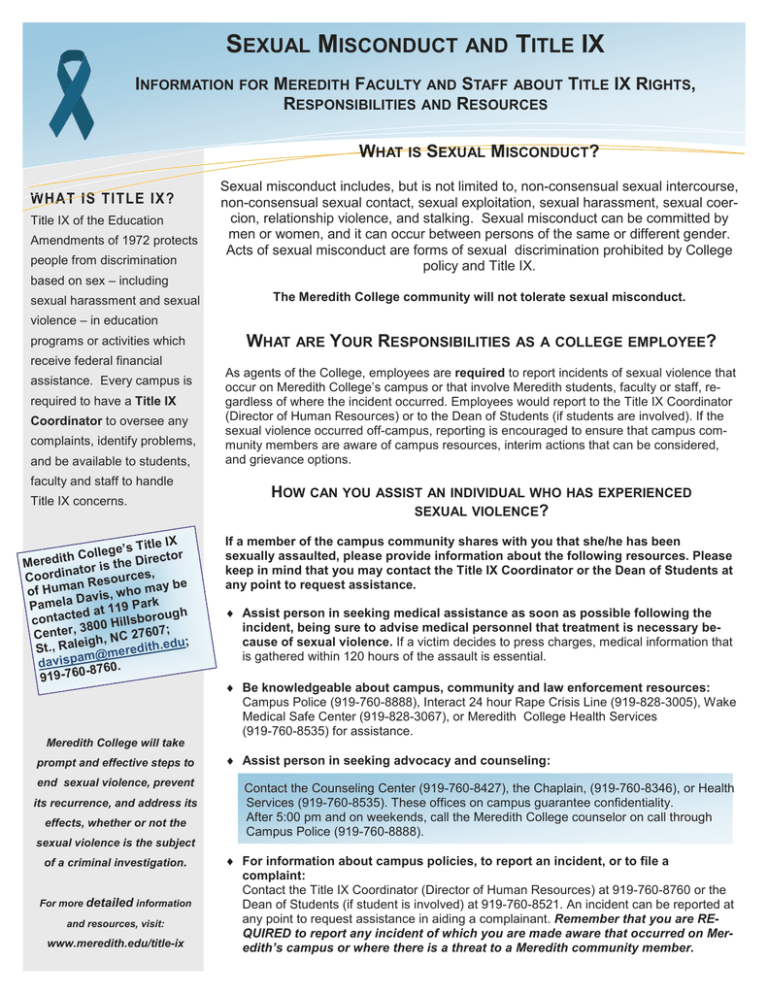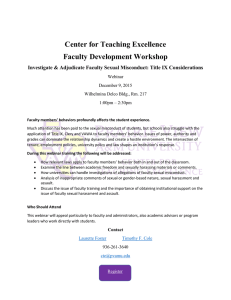
SEXUAL MISCONDUCT AND TITLE IX
Information Technology Solutions
INFORMATION FOR MEREDITH FACULTY AND STAFF ABOUT TITLE IX RIGHTS,
RESPONSIBILITIES AND RESOURCES
WHAT IS SEXUAL MISCONDUCT?
WHAT IS TITLE IX?
Title IX of the Education
Amendments of 1972 protects
people from discrimination
Sexual misconduct includes, but is not limited to, non-consensual sexual intercourse,
non-consensual sexual contact, sexual exploitation, sexual harassment, sexual coercion, relationship violence, and stalking. Sexual misconduct can be committed by
men or women, and it can occur between persons of the same or different gender.
Acts of sexual misconduct are forms of sexual discrimination prohibited by College
policy and Title IX.
based on sex – including
sexual harassment and sexual
The Meredith College community will not tolerate sexual misconduct.
violence – in education
programs or activities which
WHAT
ARE
YOUR RESPONSIBILITIES AS A COLLEGE EMPLOYEE?
receive federal financial
assistance. Every campus is
required to have a Title IX
Coordinator to oversee any
complaints, identify problems,
and be available to students,
faculty and staff to handle
Title IX concerns.
itle IX
ege’s T ctor
ll
o
C
h
Meredit tor is the Dire
a
Coordin Resources,
e
n
a
m
o ma y b
of Hu
avis, wh ark
D
la
e
P
Pam
d at 119
gh
contacte 800 Hillsborou
3
27607;
Center,
igh, NC ith.edu;
le
a
R
.,
St
red
m @me
davispa 760.
-8
919-760
As agents of the College, employees are required to report incidents of sexual violence that
occur on Meredith College’s campus or that involve Meredith students, faculty or staff, regardless of where the incident occurred. Employees would report to the Title IX Coordinator
(Director of Human Resources) or to the Dean of Students (if students are involved). If the
sexual violence occurred off-campus, reporting is encouraged to ensure that campus community members are aware of campus resources, interim actions that can be considered,
and grievance options.
HOW CAN YOU ASSIST AN INDIVIDUAL WHO HAS EXPERIENCED
SEXUAL VIOLENCE?
If a member of the campus community shares with you that she/he has been
sexually assaulted, please provide information about the following resources. Please
keep in mind that you may contact the Title IX Coordinator or the Dean of Students at
any point to request assistance.
♦ Assist person in seeking medical assistance as soon as possible following the
incident, being sure to advise medical personnel that treatment is necessary because of sexual violence. If a victim decides to press charges, medical information that
is gathered within 120 hours of the assault is essential.
♦ Be knowledgeable about campus, community and law enforcement resources:
Campus Police (919-760-8888), Interact 24 hour Rape Crisis Line (919-828-3005), Wake
Medical Safe Center (919-828-3067), or Meredith College Health Services
(919-760-8535) for assistance.
Meredith College will take
prompt and effective steps to
end sexual violence, prevent
its recurrence, and address its
effects, whether or not the
♦ Assist person in seeking advocacy and counseling:
Contact the Counseling Center (919-760-8427), the Chaplain, (919-760-8346), or Health
Services (919-760-8535). These offices on campus guarantee confidentiality.
After 5:00 pm and on weekends, call the Meredith College counselor on call through
Campus Police (919-760-8888).
sexual violence is the subject
of a criminal investigation.
For more detailed information
and resources, visit:
www.meredith.edu/title-ix
♦ For information about campus policies, to report an incident, or to file a
complaint:
Contact the Title IX Coordinator (Director of Human Resources) at 919-760-8760 or the
Dean of Students (if student is involved) at 919-760-8521. An incident can be reported at
any point to request assistance in aiding a complainant. Remember that you are REQUIRED to report any incident of which you are made aware that occurred on Meredith’s campus or where there is a threat to a Meredith community member.
SEXUAL MISCONDUCT AND TITLE IX
INFORMATION FOR MEREDITH FACULTY AND STAFF ABOUT TITLE IX RIGHTS,
RESPONSIBILITIES AND RESOURCES
Confidential Resources
While all persons receiving a report of sexual misconduct understand the desire to keep the information confidential, maintaining confidentiality is not always possible. The only individuals at Meredith College permitted to guarantee confidentiality are licensed counselors in the Counseling Center, the campus chaplain, and medical and nursing
staff in Meredith College Health Services. To the extent possible, the College will respect a student’s request to
remain anonymous and to keep the details of the report confidential; however, the request for confidentiality will be
weighed against the College’s obligation to act on information it has received in order to provide a safe and nondiscriminatory environment.
Complaint/Grievance Resolution
Sexual violence committed by a Meredith College community member violates the College’s Sexual Misconduct
Policy. Complainants may refer to this policy for information about filing a complaint and seeking resolution. Reports of sexual misconduct may be made to the College’s Title IX Coordinator, Pamela Davis, or Dean of Students
Ann Gleason (if Meredith students are involved).
Grievances filed against Meredith College students, faculty and staff who are accused of sexual misconduct can
be adjudicated by the College’s Grievance Hearing Board. During a Meredith College Grievance Board Hearing
involving sexual misconduct, the complainant and respondent are entitled to the same opportunities to have an adviser present during the hearing. In hearings involving sexual misconduct, the preponderance of evidence standard
will be used. Upon request of a Meredith student, sexual misconduct committed by a student from another campus
can be referred by the dean of students to that student’s campus for judicial action. Detailed information about
Meredith College’s Sexual Conduct Policy and related procedures are available in student and faculty/staff handbooks in addition to the Meredith College Title IX web page: www.meredith.edu/title-ix
In addition, a person may report incidents of sexual violence to Campus Police or local law enforcement authorities
at any time in the complaint or resolution process. Campus Police is available to offer advice about legal options. In cases involving potential crime, the College must determine, consistent with State and local law, whether
appropriate law enforcement or other authorities should be notified.
Interim Actions
Even if a person does not wish to file a formal complaint with the College or to off-campus law enforcement, she/he
may request interim options to ensure safety. These may include: counseling, rearrangement of class schedule or
living space, arrangement for additional time to complete a course or re-take/withdraw from a class, request a nocontact order, request that a trespass order by issued, etc.
Non-Retaliation Policy
It is a violation of the College’s Harassment and Non-Discrimination Policy to retaliate against a person who has
complained about sexual misconduct, harassment or discrimination (or for assisting, participating or cooperating in
an investigation or grievance related to a complaint).
♦
♦
Anyone can experience sexual violence, but most victims are female – 20% to 25% of college women reported experiencing an attempted or completed rape during college, most often by someone they know. These statistics underestimate the problem since many cases are not reported.
On average, at least 50% of campus sexual assaults involve alcohol. Most offenders use alcohol as their main weapon of choice against their
victims.
*Source: “Understanding Sexual Violence” fact sheet, CDC’s National Center for Injury Prevention and Control, Division of Violence Prevention, 2011.


